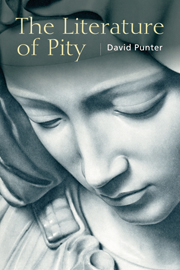Book contents
- Frontmatter
- Contents
- Plates
- Preface
- Acknowledgements
- 1 Distinguishing Pity
- 2 Pity and Terror: The Aristotelian Framework
- 3 Pietà
- 4 Shakespeare on Pity
- 5 The Eighteenth Century
- 6 Blake: ‘Pity would be no more …’
- 7 Aspects of Victoriana
- 8 Chekhov and Brecht: Pity and Self-Pity
- 9 ‘War, and the pity of War’: Wilfred Owen, David Jones, Primo Levi
- 10 Reflections on Algernon Blackwood's Gothic
- 11 Pity's Cold Extremities: Jean Rhys and Stevie Smith
- 12 Reclaiming the Savage Night
- 13 ‘Pity the Poor Immigrant’: Pity, Diaspora, the Colony
- 14 Lyric and Pity
- After Thought: Under the Dome
- Notes
- Bibliography
- Index
7 - Aspects of Victoriana
Published online by Cambridge University Press: 05 September 2014
- Frontmatter
- Contents
- Plates
- Preface
- Acknowledgements
- 1 Distinguishing Pity
- 2 Pity and Terror: The Aristotelian Framework
- 3 Pietà
- 4 Shakespeare on Pity
- 5 The Eighteenth Century
- 6 Blake: ‘Pity would be no more …’
- 7 Aspects of Victoriana
- 8 Chekhov and Brecht: Pity and Self-Pity
- 9 ‘War, and the pity of War’: Wilfred Owen, David Jones, Primo Levi
- 10 Reflections on Algernon Blackwood's Gothic
- 11 Pity's Cold Extremities: Jean Rhys and Stevie Smith
- 12 Reclaiming the Savage Night
- 13 ‘Pity the Poor Immigrant’: Pity, Diaspora, the Colony
- 14 Lyric and Pity
- After Thought: Under the Dome
- Notes
- Bibliography
- Index
Summary
As I have suggested, it would of course be possible to approach the word ‘pity’ from a structuralist perspective: to analyse it in terms of its cognate terms (‘mercy’, ‘compassion’, ‘sympathy’, even ‘ruth’), and those with which it most often appears in opposition (a far longer and more complicated list). But the trouble with words is that they rarely prove properly amenable to such treatment; they tend to slip and slide, to drip (in some ways like tears) into other realms and dimensions, to morph before our eyes and ears. Historically, it would be fair to say that it is this propensity of words to elude a precise signification which, regardless of the orientations of specific critics, thinkers, theorists, philosophers, caused what can now be seen as the eclipse of structuralism by the various ‘arts and sciences’ sometimes known under the collective name of deconstruction.
In the study of any emotion or passion, there is a continuing excess: there is an enduring instability, a process of what Nicholas Royle refers to as ‘veering’, which means that one finds oneself trying to pick one's way through a thicket – or, perhaps better, swamp – of associations. The task could be defined as trying to avoid the threat of that fearsome (and possibly prehistoric) monster known as the ‘thesaurus’; itself based in what one might refer to as the ‘encyclopaedic heresy’, the notion that it would be possible in some imaginable linguistic universe to provide an exhaustive list of denotations and connotations. And that, of course, is the process, the aspiration, in which dictionaries are based. Dictionary and encyclopaedia: late efflorescences of the ‘encyclopaedist’ hopes of enlightenment.
- Type
- Chapter
- Information
- The Literature of Pity , pp. 72 - 82Publisher: Edinburgh University PressPrint publication year: 2014



